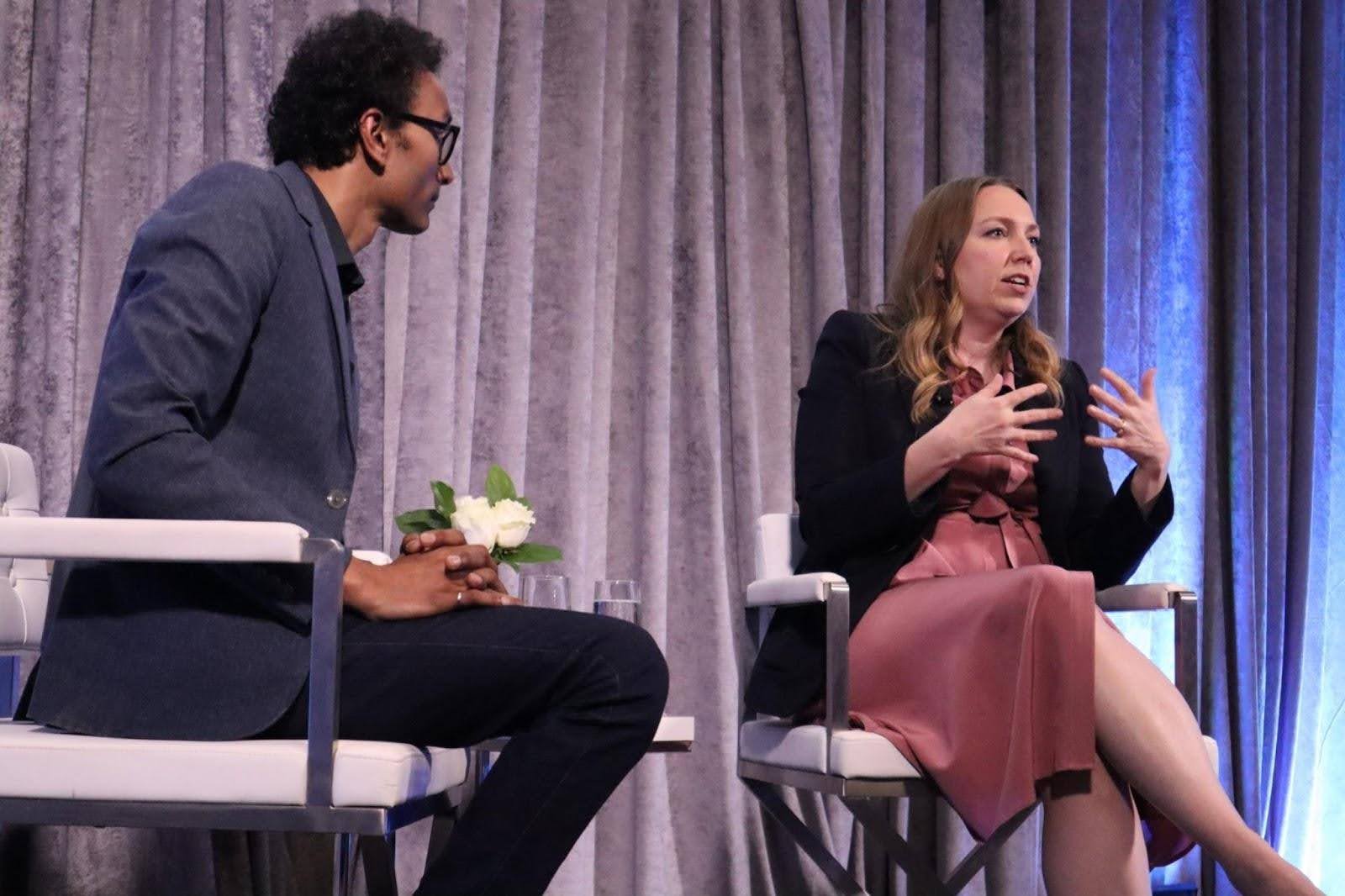A conversation with RBC’s Chief Economist: How the geopolitical landscape is impacting non-profits
Why It Matters
The state of Canada’s economy greatly impacts non-profit’s funding, operations and the communities they serve. Sharing economic data helps organizations make strategic operational decisions.

This story was produced thanks to a partnership between Future of Good and RBC. RBC is proud to support a broad range of community initiatives through donations, community investments and employee volunteer activities. See how at rbc.com/peopleandplanet. See FOG’s editorial ethics and standards here.
Non-profits in Canada should brace for more upheaval amidst increasing geopolitical uncertainty, according to the chief economist of Canada’s largest bank.
“The economy is going to weaken, and the unemployment rate is going to rise. This is not something that I want to say,” said Frances Donald, RBC’s chief economist.
About 50 non-profits recently gathered in Toronto to hear from Donald, who is known for her ability to simplify complex economic ideas. RBC’s goal was to bring organizations together in hopes of creating meaningful conversations to help shape future policy.
“Let’s start talking about our economy like it belongs to Canadians and Canadian people and not like it is a number on a spreadsheet.”
 Non-profit leaders listen as Future of Good CEO, Vinod Rajasekaran speaks with RBC’s chief economist Frances Donald about the growing economic concerns faced by non-profits. (Abigail Turner/Future of Good)
Non-profit leaders listen as Future of Good CEO, Vinod Rajasekaran speaks with RBC’s chief economist Frances Donald about the growing economic concerns faced by non-profits. (Abigail Turner/Future of Good)
She was joined by Future of Good’s CEO Vinod Rajasekaran, who asked Donald how she would characterize the state of Canada’s current economy.
Her metaphor? She suggested viewing the economy as the country’s immune system.
Economic diagnosis
Both the economy and an immune system are complex, interconnected, and constantly responding to external threats, she explained.
Economic “viruses” come as inflation, supply chain disruptions and geopolitical conflicts. These threats test the country’s “immune system” and resilience.
“The U.S. economy is Arnold Schwarzenegger on Venice Beach drinking green juice, pumping iron,” said Donald.
Canada’s economy, however, hasn’t been performing at the same level lately, she said.
“Now, we have to think about what medicine we’re going to give to ourselves,” Donald said.
“We do get hit with viruses. We do get hit with problems that come along. If you have resilience in your economy, it allows you to make sure that people don’t lose as many jobs.”
For non-profits operating on the front lines, understanding these dynamics is important, not only to know what supports will be needed, but to be part of the solution.
“There will be more urgent needs for large segments of this population,” said Donald. “The governments are going to need critical partners to support them in both recognizing where those challenges are, but also attempting to remedy them.”
Economic ally
Those remedies demand bold thinking and collaborative action, Rajasekaran added.
Non-profits contribute eight per cent to Canada’s GDP, yet Rajasekaran said charities are often left out of conversations about economic growth and policy.
It sometimes feels like the non-profit sector is a blind spot for the economy, said Rajasekaran.
“There’s a range of contributions that non-profits and charities make coast to coast in every community,” he said.
“How can we put an [bigger lens on the] economic value on the contributions and the value of non-profits?”
That value needs to be amplified to stakeholders and political leaders, said Donald.
“Maybe we need to be louder. Maybe we need to be on the front pages,” said Donald. “Part of this might be a campaign to say, non-profits are part of the solutions for the problems that are coming up.”
“I spend a lot of time wondering if corporate Canada and sometimes governments aren’t aware of the problems that exist,” said Donald.
Pushing non-profits into the conversation
In 2024, RBC, RBC Foundation and RBC Foundation USA together provided more than $184 million globally through community investments. In Canada, RBC and RBC Foundation provide funding to Canadian charities and non-profits, empowering them to amplify their positive impact in local communities.
“It’s a very scary and precarious time for non-profits,” said Emma Asiedu-Akrofi, the CEO of FORA Network for Change.
The organization is one of the many charities that have received funding from RBC Foundation. FORA works to help young women enter leadership fields across Canada.
“As a foundation, RBC provides the best funding in the sense that … they trust their organizations,” she said.
“To have the flexibility to plan long term in this climate and know that they honour and respect the work that we do, is amazing.”
Boosting the voices of non-profits is something Jennifer Hollett, of The Walrus is well-versed in.
“I think we are in pivotal times,” said Hollett, the executive director of The Walrus.
The organization is both a registered journalism organization and a registered charity, giving it a unique perspective on economic concerns.
“With continuous turbulent times and with an economy that’s connected to Canada-U.S. relations, we have to make some big decisions, and our policy makers are going to have to decide how we surf those waves.”
A hopeful future
The social sector continues to face growing demands, as community needs rise while organizations face staff shortages, limited resources, and widespread staff burnout.
A weakening economy will not only make those demands more dire but will require innovative ideas, said Donald.
“I think there’s going to be a thirst from corporate Canada to hear more about creative solutions to some of the challenges that Canada is facing,” Donald said.
That outlook gave some leaders, including Wendy Rinella of the Oakville Community Foundation, optimism for the future.
“There will be short-term issues, but I think we can restructure and rebuild,” said Rinella. “The sector is quite robust, and Canada has a good set of values and programs.”
The optimism is shared by RBC, who emphasized the important role non-profits play in building resilient communities and shaping economic solutions.
“We know that community organizations like you are the ones that have on-the-ground insights and ideas to drive meaningful, lasting positive change,” said Andrea Barrack, SVP, Sustainability and Impact, RBC.
“If we invest in non-profits, then they can really help make a difference by turning ideas into action,” she added.
“And I would say action has probably never been more urgent.”
“I see it from every donor that I work with, they see real value in supporting our local communities,” echoed Rinella.
“There’s a growing understanding that non-profits aren’t just responding to challenges, they’re part of the solution,” she said.

